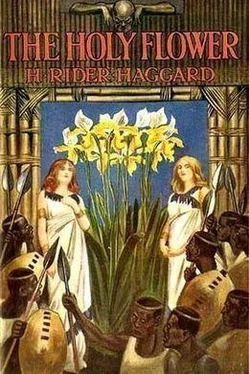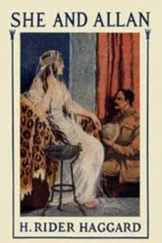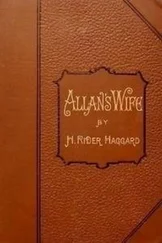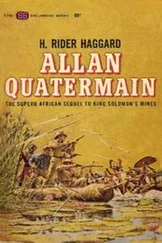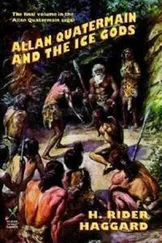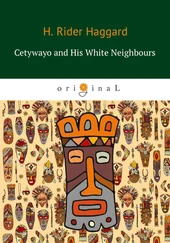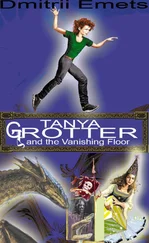Генри Хаггард - Allan and the Holy Flower
Здесь есть возможность читать онлайн «Генри Хаггард - Allan and the Holy Flower» — ознакомительный отрывок электронной книги совершенно бесплатно, а после прочтения отрывка купить полную версию. В некоторых случаях можно слушать аудио, скачать через торрент в формате fb2 и присутствует краткое содержание. Год выпуска: 2014, Издательство: epubBooks Classics, Жанр: Путешествия и география, на английском языке. Описание произведения, (предисловие) а так же отзывы посетителей доступны на портале библиотеки ЛибКат.
- Название:Allan and the Holy Flower
- Автор:
- Издательство:epubBooks Classics
- Жанр:
- Год:2014
- ISBN:нет данных
- Рейтинг книги:5 / 5. Голосов: 1
-
Избранное:Добавить в избранное
- Отзывы:
-
Ваша оценка:
- 100
- 1
- 2
- 3
- 4
- 5
Allan and the Holy Flower: краткое содержание, описание и аннотация
Предлагаем к чтению аннотацию, описание, краткое содержание или предисловие (зависит от того, что написал сам автор книги «Allan and the Holy Flower»). Если вы не нашли необходимую информацию о книге — напишите в комментариях, мы постараемся отыскать её.
Allan and the Holy Flower — читать онлайн ознакомительный отрывок
Ниже представлен текст книги, разбитый по страницам. Система сохранения места последней прочитанной страницы, позволяет с удобством читать онлайн бесплатно книгу «Allan and the Holy Flower», без необходимости каждый раз заново искать на чём Вы остановились. Поставьте закладку, и сможете в любой момент перейти на страницу, на которой закончили чтение.
Интервал:
Закладка:
We were in a little circle now of which somehow I found myself the centre, and they were attacking us on all sides. Stephen got a knock on the head from the butt end of a gun, and tumbled against me, nearly upsetting me. As I recovered myself I looked round in despair.
Now it was that I saw a very welcome sight, namely Hans, yes, the lost Hans himself, with his filthy hat whereof I noticed even then the frayed ostrich feathers were smouldering, hanging by a leather strap at the back of his head. He was shambling along in a sly and silent sort of way, but at a great rate with his mouth open, beckoning over his shoulder, and behind him came about one hundred and fifty Mazitu.
Those Mazitu soon put another complexion upon the affair, for charging with a roar, they drove back the Arabs, who had no space to develop their line, straight into the jaws of that burning hell. A little later the rest of the Mazitu returned with Babemba and finished the job. Only quite a few of the Arabs got out and were captured after they had thrown down their guns. The rest retreated into the centre of the market–place, whither our people followed them. In this crisis the blood of these Mazitu told, and they stuck to the enemy as Zulus themselves would certainly have done.
It was over! Great Heaven! it was over, and we began to count our losses. Four of the Zulus were dead and two others were badly wounded—no, three, including Mavovo. They brought him to me leaning on the shoulder of Babemba and another Mazitu captain. He was a shocking sight, for he was shot in three places, and badly cut and battered as well. He looked at me a little while, breathing heavily, then spoke.
"It was a very good fight, my father," he said. "Of all that I have fought I can remember none better, although I have been in far greater battles, which is well as it is my last. I foreknew it, my father, for though I never told it you, the first death lot that I drew down yonder in Durban was my own. Take back the gun you gave me, my father. You did but lend it me for a little while, as I said to you. Now I go to the Underworld to join the spirits of my ancestors and of those who have fallen at my side in many wars, and of those women who bore my children. I shall have a tale to tell them there, my father, and together we will wait for you—till you, too, die in war!"
Then he lifted up his arm from the neck of Babemba, and saluted me with a loud cry of Baba! Inkosi! giving me certain great titles which I will not set down, and having done so sank to the earth.
I sent one of the Mazitu to fetch Brother John, who arrived presently with his wife and daughter. He examined Mavovo and told him straight out that nothing could help him except prayer.
"Make no prayers for me, Dogeetah," said the old heathen; "I have followed my star," (i.e. lived according to my lights) "and am ready to eat the fruit that I have planted. Or if the tree prove barren, then to drink of its sap and sleep."
Waving Brother John aside he beckoned to Stephen.
"O Wazela!" he said, "you fought very well in that fight; if you go on as you have begun in time you will make a warrior of whom the Daughter of the Flower and her children will sing songs after you have come to join me, your friend. Meanwhile, farewell! Take this assegai of mine and clean it not, that the red rust thereon may put you in mind of Mavovo, the old Zulu doctor and captain with whom you stood side by side in the Battle of the Gate, when, as though they were winter grass, the fire burnt up the white–robed thieves of men who could not pass our spears."
Then he waved his hand again, and Stephen stepped aside muttering something, for he and Mavovo had been very intimate and his voice choked in his throat with grief. Now the old Zulu's glazing eye fell upon Hans, who was sneaking about, I think with a view of finding an opportunity of bidding him a last good–bye.
"Ah! Spotted Snake," he cried, "so you have come out of your hole now that the fire has passed it, to eat the burnt frogs in the cinders. It is a pity that you who are so clever should be a coward, since our lord Macumazana needed one to load for him on the hill and would have killed more of the hyenas had you been there."
"Yes, Spotted Snake, it is so," echoed an indignant chorus of the other Zulus, while Stephen and I and even the mild Brother John looked at him reproachfully.
Now Hans, who generally was as patient under affront as a Jew, for once lost his temper. He dashed his hat upon the ground, and danced on it; he spat towards the surviving Zulu hunters; he even vituperated the dying Mavovo.
"O son of a fool!" he said, "you pretend that you can see what is hid from other men, but I tell you that there is a lying spirit in your lips. You called me a coward because I am not big and strong as you were, and cannot hold an ox by the horns, but at least there is more brain in my stomach than in all your head. Where would all of you be now had it not been for poor Spotted Snake the 'coward,' who twice this day has saved every one of you, except those whom the Baas's father, the reverend Predikant, has marked upon the forehead to come and join him in a place that is even hotter and brighter than that burning town?"
Now we looked at Hans, wondering what he meant about saving us twice, and Mavovo said:
"Speak on quickly, O Spotted Snake, for I would hear the end of your story. How did you help us in your hole?"
Hans began to grub about in his pockets, from which finally he produced a match–box wherein there remained but one match.
"With this," he said. "Oh! could none of you see that the men of Hassan had all walked into a trap? Did none of you know that fire burns thatched houses, and that a strong wind drives it fast and far? While you sat there upon the hill with your heads together, like sheep waiting to be killed, I crept away among the bushes and went about my business. I said nothing to any of you, not even to the Baas, lest he should answer me, 'No, Hans, there may be an old woman sick in one of those huts and therefore you must not fire them.' In such matters who does not know that white people are fools, even the best of them, and in fact there were several old women, for I saw them running for the gateway. Well, I crept up by the green fence which I knew would not burn and I came to the north gate. There was an Arab sentry left there to watch.
"He fired at me, look! Well for Hans his mother bore him short"; and he pointed to a hole in the filthy hat. "Then before that Arab could load again, poor coward Hans got his knife into him from behind. Look!" and he produced a big blade, which was such as butchers use, from his belt and showed it to us. "After that it was easy, since fire is a wonderful thing. You make it small and it grows big of itself, like a child, and never gets tired, and is always hungry, and runs fast as a horse. I lit six of them where they would burn quickest. Then I saved the last match, since we have few left, and came through the gate before the fire ate me up; me, its father, me the Sower of the Red Seed!"
We stared at the old Hottentot in admiration, even Mavovo lifted his dying head and stared. But Hans, whose annoyance had now evaporated, went on in a jog–trot mechanical voice:
"As I was returning to find the Baas, if he still lived, the heat of the fire forced me to the high ground to the west of the fence, so that I saw what was happening at the south gate, and that the Arab men must break through there because you who held it were so few. So I ran down to Babemba and the other captains very quickly, telling them there was no need to guard the fence any more, and that they must get to the south gate and help you, since otherwise you would all be killed, and they, too, would be killed afterwards. Babemba listened to me and started sending out messengers to collect the others and we got here just in time. Such is the hole I hid in during the Battle of the Gate, O Mavovo. That is all the story which I pray that you will tell to the Baas's reverend father, the Predikant, presently, for I am sure that it will please him to learn that he did not teach me to be wise and help all men and always to look after the Baas Allan, to no purpose. Still, I am sorry that I wasted so many matches, for where shall we get any more now that the camp is burnt?" and he gazed ruefully at the all but empty box.
Читать дальшеИнтервал:
Закладка:
Похожие книги на «Allan and the Holy Flower»
Представляем Вашему вниманию похожие книги на «Allan and the Holy Flower» списком для выбора. Мы отобрали схожую по названию и смыслу литературу в надежде предоставить читателям больше вариантов отыскать новые, интересные, ещё непрочитанные произведения.
Обсуждение, отзывы о книге «Allan and the Holy Flower» и просто собственные мнения читателей. Оставьте ваши комментарии, напишите, что Вы думаете о произведении, его смысле или главных героях. Укажите что конкретно понравилось, а что нет, и почему Вы так считаете.
